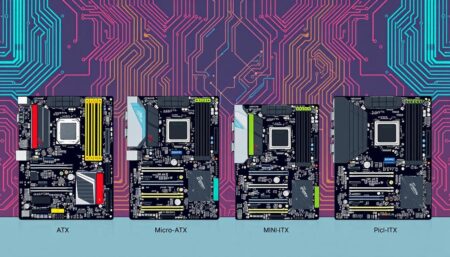Graphics cards and motherboards are two essential components of a computer system. The graphics card is responsible for rendering images and videos, while the motherboard acts as a bridge between all the other components. The compatibility between a graphics card and a motherboard is a critical aspect that needs to be considered before making a purchase. In this article, we will explore the question, “Can I use any graphics card with any motherboard?”
The answer is no. Not all graphics cards are compatible with all motherboards. There are several factors to consider when choosing a graphics card for your motherboard.
First, you need to consider the interface of your motherboard. The most common interface used in modern motherboards is PCIe (Peripheral Component Interconnect Express). Graphics cards also use PCIe as their primary interface. However, the number of PCIe lanes, version, and speed supported by the motherboard and graphics card must be the same to ensure compatibility. For instance, a PCIe 3.0 graphics card will not work with a motherboard that supports only PCIe 2.0.
Another factor to consider is the power supply. Graphics cards require a considerable amount of power to function correctly. The power supply unit (PSU) must have enough wattage to meet the power requirements of the graphics card. Additionally, the PSU must have the correct power connectors to connect to the graphics card. The most common power connectors are 6-pin and 8-pin PCIe connectors.
You also need to consider the physical dimensions of the graphics card. Graphics cards come in various sizes, and not all of them will fit into your computer case. The most common form factors for graphics cards are ATX and micro-ATX. Make sure to check the dimensions of your computer case and compare them with the graphics card you want to purchase.
The next factor to consider is the compatibility of the graphics card with the operating system (OS). Most graphics cards are compatible with Windows and Linux operating systems. However, if you are using an older operating system, you need to ensure that the graphics card you want to purchase is compatible.
Finally, you need to check the compatibility of the graphics card with the other components in your system, such as the CPU and RAM. The compatibility of these components can affect the overall performance of your computer system.
In conclusion, the answer to the question, “Can I use any graphics card with any motherboard?” is no. There are several factors to consider when choosing a graphics card for your motherboard, such as the interface, power supply, physical dimensions, compatibility with the operating system, and compatibility with other components.
At the end of the day, it’s essential to do your research and consult the documentation of your motherboard and graphics card before making a purchase. You can also seek advice from experts in the field, such as computer technicians or customer support representatives.
We hope this article has been helpful in providing you with the necessary information to choose a compatible graphics card for your motherboard. Remember to consider all the factors mentioned above before making a purchase.
